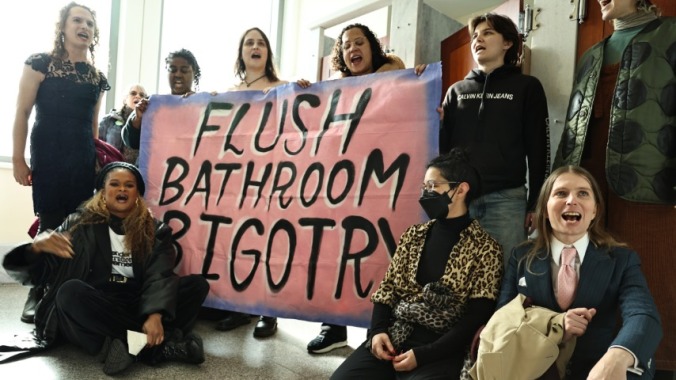Trans Rights Organizers Say Democrats Are Using Trump as a ‘Scapegoat’ for Their Own Inaction
Last week, Raquel Willis of Gender Liberation Movement organized dozens of trans activists and their allies to occupy bathrooms on Capitol Hill in protest of Speaker Mike Johnson’s bigoted new policy.
Politics
In November, House Republicans led by Speaker Mike Johnson and Rep. Nancy Mace of South Carolina “welcomed” their incoming colleague Sarah McBride — the first openly trans person elected to Congress — with a ban on trans people using the bathroom of their gender identity on Capitol Hill. Mace has since introduced a bill that would apply this ban to museums, national parks, and other federal property across the country.
So far, the Democratic Party’s response has been fairly muted. Minority Leader Hakeem Jeffries condemned Mace’s frenzied posting and harassment against trans people, declaring last month that she “clearly needs an intervention.” But party leadership has yet to share any actions to protect McBride or other trans Congressional staffers who could be blocked from safely using the restroom. McBride, herself, responded by calling bigotry a “distraction,” adding, “I’m not here to fight about bathrooms.” Their antics, she said, expose that the GOP “[has] no real solutions to what Americans are facing.” Some trans voices called McBride’s framing of these attacks dismissive.
But the work of standing up for trans rights should fall on the entire Democratic Party, not just trans people like McBride. So, on Thursday, Raquel Willis, founder of the organization Gender Liberation Movement, and dozens of other trans activists and allies — including reproductive rights activists and U.S. Army whistleblower Chelsea Manning — occupied Capitol Hill bathrooms in protest. 15 protesters were arrested for “crowding, obstructing or incommoding,” according to Axios.
The activists chanted, “Speaker Johnson, Nancy Mace, our genders are no debate!” and “Democrats, grow a spine, trans lives are on the line!” They demanded that Congress block Mace’s bigoted bill, and for Democrats to take meaningful action to protect trans rights as they fall under increasing attack across the country. Despite the protest chants, Democratic Congressional leadership offered zero acknowledgment of the sit-in. Meanwhile, Mace responded shortly after the protest by posting a video of herself calling the protesters a transphobic slur, to zero consequence from Congressional leadership or condemnations from Democrats.
-

-

-

-

-

-

-

-

-

-

-

-

-

-

-

-

-

-

-

-

-

-

-

-

-

-

-

-

-

-

-

-

-

-

-

-

-

-

-

-








































